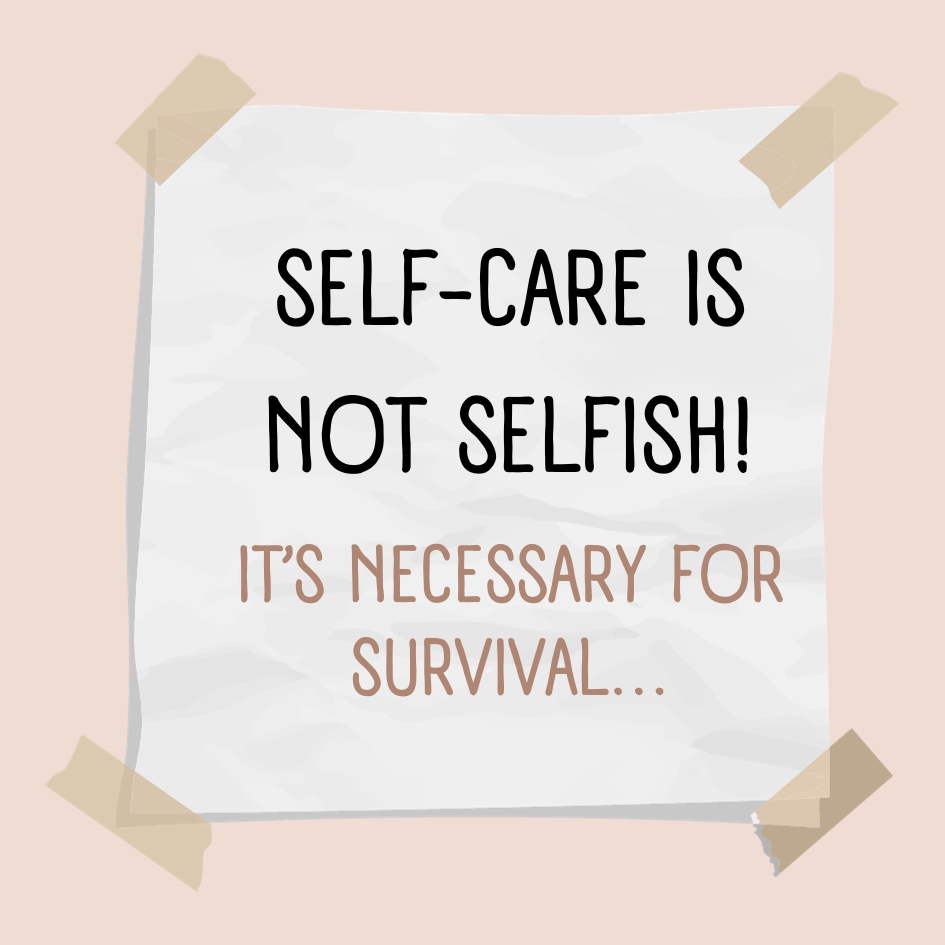
A good buddy that I coached with for years used to joke that “the worst kind of fish is a ‘selfish” and we always howled when he said it. In some ways there was truth to this and in other ways not.
According to Merriam Webster, the word selfish has the following two main definitions:
- concerned excessively or exclusively with oneself: seeking or concentrating on one’s own advantage, pleasure, or well-being without regard for others; and,
- arising from concern with one’s own welfare or advantage in disregard of others
When you consider these points you realize that in sports and business you want people to be selfish first, and a good teammate second.
Lunacy, Tim! What on earth do you mean? Isn’t selfish the worst kind of fish???
The picture above calls it self-care.
Allow me to elaborate. Let’s start with the sports perspective. As a coach I want every player to be selfish (see definitions above) – in their own preparation and development. This is because a player can only focus on their own situation, not anyone else’s. If a player does not focus on their own preparation and training they will not be able to consistently deliver what the team needs to be successful in games.
If I am wasting mental space “worrying” about how my teammates are doing then I am taking away focus from my own preparation and development. This is not good.
Flip over to a business perspective. If employees are not selfish in their personal development and improvement how can they be counted on to deliver when their colleagues need them.
One definition of team I like is: “Do your job and trust your teammate will do theirs.”
This mindset must obviously include what an individual does in the off season and even during the season when no one is watching. All the little things you do to improve your mental and physical skills can accumulate into better performance by you, and for your team.
Look at this concept from another view. If you are not selfishly putting in the time to be ready for the season then you are falling behind.
“Hard work beats talent when talent doesn’t work hard, is a powerful statement. But when you have talent and hard work combined you are virtually unstoppable whether in sports or business.
Every winning game plan includes talent acquisition and development tactics that result in talent retention. Many successful sports teams are consistently at the top of their respective league because they “draft and develop” high end talent. Adding in some “free agents” that have already proven themselves in their sport can create an extraordinarily strong team.
When a free agent is added the character of that person is extremely important to factor in so that there is a net gain to the team and not a net loss or distraction. Armchair quarterbacks will pick apart a team for overpaying for a free agent that doesn’t pan out and bring the requisite talent and results that were hoped for when the player was acquired.
Remember that there are always exceptions. Not all great players will be great on another team – too many variables in terms of players, coaching, management, and such, to predict the level of future success.
Every generalization is false…including this one.
In business, an often used adage is “hire for talent and train for skill.” This is fine, but there is a responsibility of the employee to continue to develop on their own, too.
In business, I am not talking about spending your life and all your free time doing taking training and development programs. You must have a balance in your life. I am suggesting that if you want to be noticed (for the right reasons) and provide opportunities for personal growth and development and challenge then you have to have a selfish mindset. You are in control of your own destiny – why leave it in someone else’s hands. If you do…don’t whine later.
I wanted to play pro football…and I did. I played with guys that had more talent, but I know how hard I worked and all the little things I did that not all of them did. And this is not a criticism. Some did not want to play past university and that is OK. I did so there was more I had to do.
In business, I wanted to achieve certain goals…and I did. I did a lot of personal development and I still do. I set personal targets and identify what I needed to do to achieve them. Lots more checkmarks than x-marks.
And in both sports and business I was a good teammate. I supported my mates, encouraged them, and accepted victories and defeats with them.
This is part of life.
And I know that to be a good teammate, I had to, selfishly, be a good “Tim-mate” first.
Onward!


You must be logged in to post a comment.